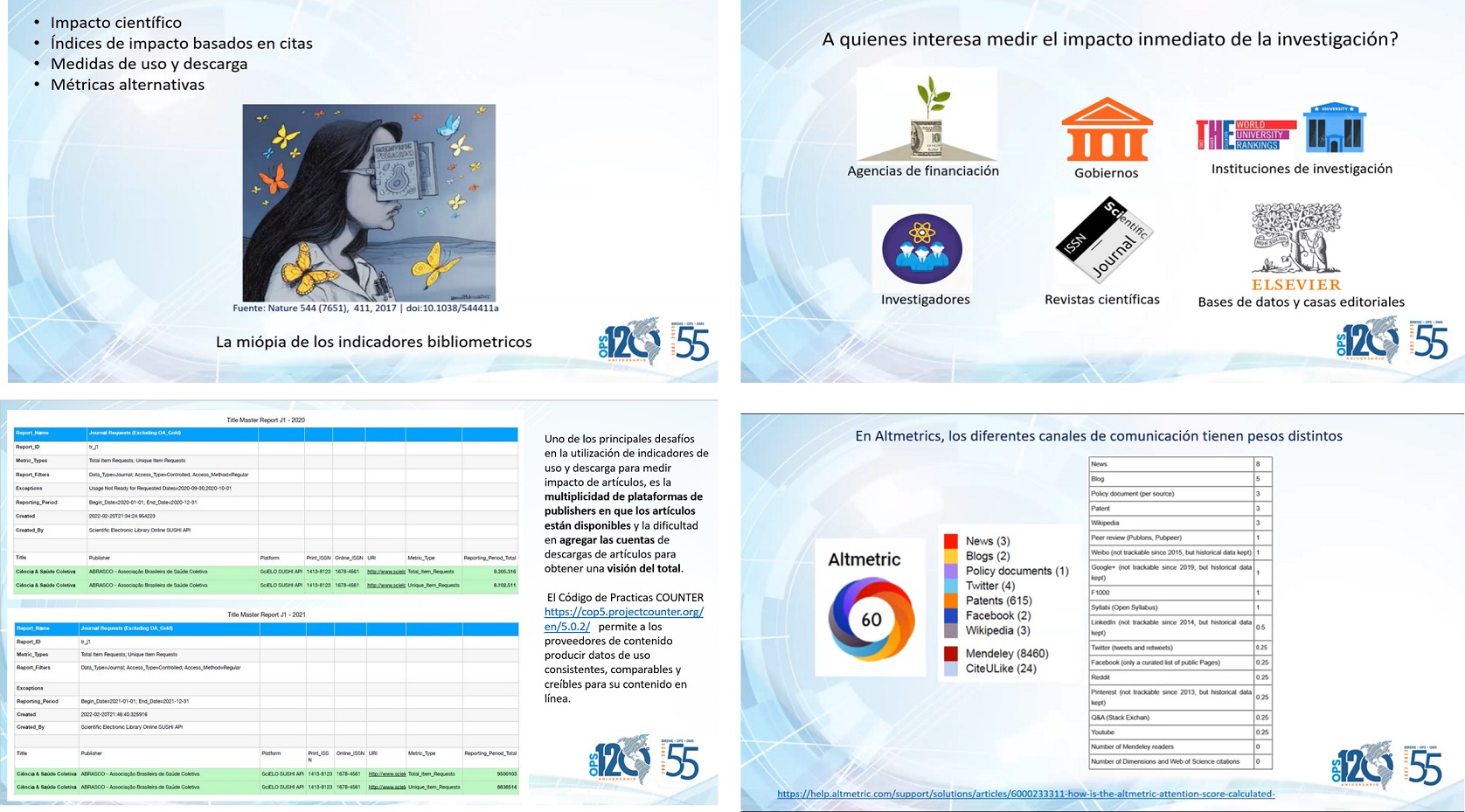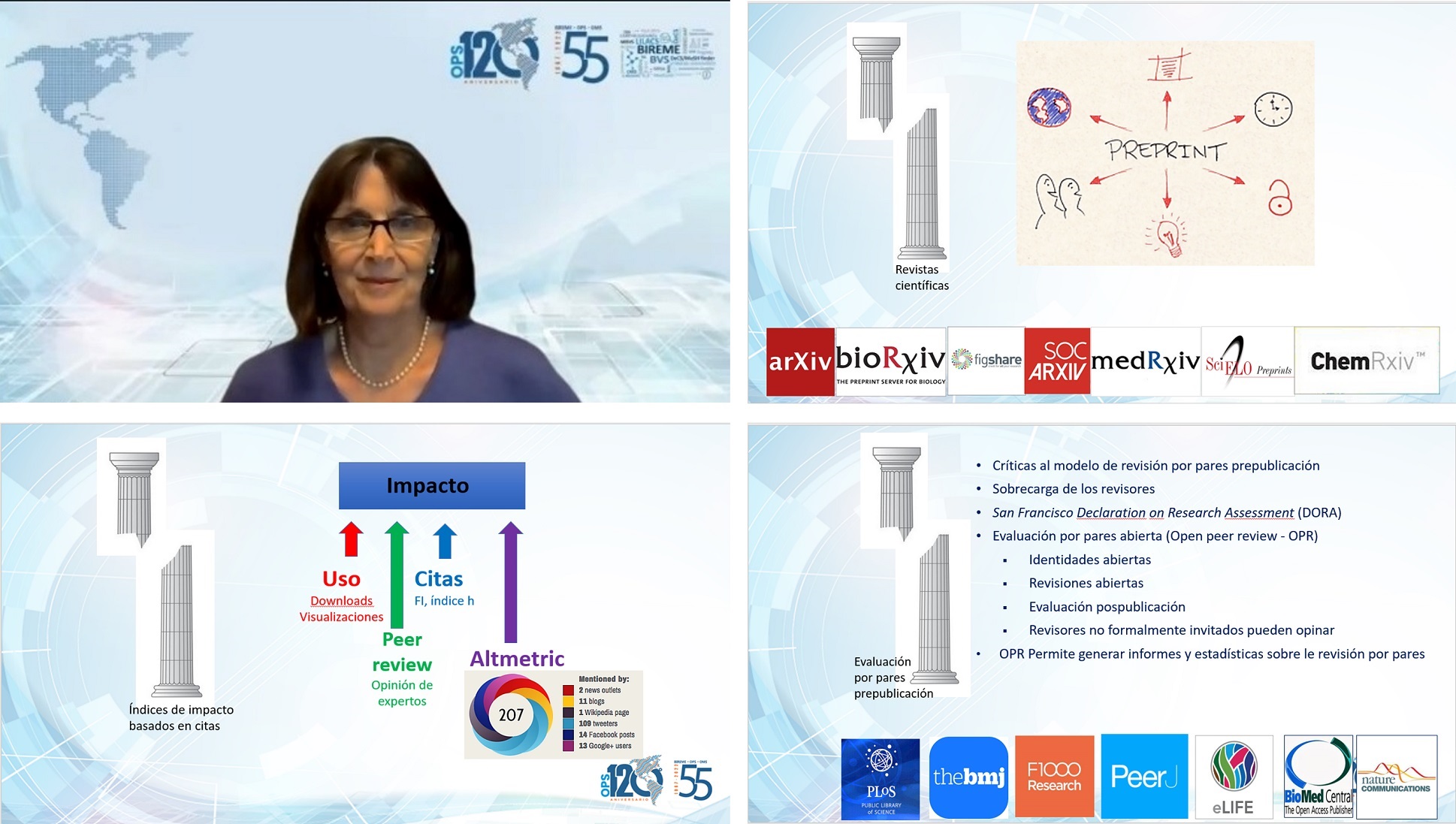Training activities in scholarly communication through face-to-face or online courses[1], workshops or webinars are intended to stimulate the publication of the results of scientific research and clinical observation. The Latin American and Caribbean Center on Health Sciences Information/Pan American Health Organization/World Health Organization (BIREME/PAHO/WHO) coordinates these activities as part of its work plan and lines of action for technical cooperation with the countries of the Region.
The Action Plan for the continuous development and dissemination of the VHL Nicaragua, a line of action coordinated with the Latin American and Caribbean Center on Health Sciences Information (BIREME/PAHO/WHO), PAHO/WHO Nicaragua and the National Autonomous University of Nicaragua in Managua (UNAN Managua) organized a series of three webinars on scholarly communication. The first, on Ethics and Integrity in Research, was held last April and was the subject of news in this Bulletin[2]. Lilian Calò[3], Coordinator of Scholarly communication and Institutional Communication at BIREME/PAHO/WHO, is in charge of the webinars.
The second webinar, held on May 11, was about Science Assessment: Impact Indices, and addressed the evolution of impact metrics from the creation of the Impact Factor by Eugene Garfield in 1975 to the contribution of social networks in scholarly communication, through usage and download metrics and new databases such as Dimensions, whose main innovation is to provide metrics at the document level and not at the journal level, as per usual.
 The virtual session was attended by 116 participants, who showed great interest in the topic, asking questions and making comments in the chat. Reviews mention, for example: “Excellent. Thank you very much for helping us to understand the meaning of the different bibliographic indicators and to use them with care”; “Very good information”; “Excellent, to assess the relative importance of the impact factor of the same scientific area”; “Thank you so much for your presentation, I’m always learning.” Some participants solved the exercises and sent them to the speaker, who returned them to each one with corrections and comments. The presentation in PDF format is sent to the participants, as is usual practice of BIREME in the training it promotes, in favor of open access to learning resources.
The virtual session was attended by 116 participants, who showed great interest in the topic, asking questions and making comments in the chat. Reviews mention, for example: “Excellent. Thank you very much for helping us to understand the meaning of the different bibliographic indicators and to use them with care”; “Very good information”; “Excellent, to assess the relative importance of the impact factor of the same scientific area”; “Thank you so much for your presentation, I’m always learning.” Some participants solved the exercises and sent them to the speaker, who returned them to each one with corrections and comments. The presentation in PDF format is sent to the participants, as is usual practice of BIREME in the training it promotes, in favor of open access to learning resources.
The third and final webinar of the series, held on May 25, discussed the dimensions of open science and the future of scholarly communication. In response to a request from the VHL Network and the sessions on Strengthening Health Information Networks in Latin America and the Caribbean, the invitation to this webinar was extended to participants from the VHL Networks, LILACS, Referencers, Indexers, Editors, and BiblioSUS, who can also benefit from the theme of strengthening the Networks coordinated by BIREME/PAHO/WHO regionally with national institutions.
 The presentation talked about new ways of reporting research results, through preprints and their contribution to streamlining scholarly communication. It also discussed the reasons that led to the adoption of open practices, like open peer review and open research data, which together with open access make up the pillars that support open science. This movement is not a fad or something passing that can be ignored, but a global trend in all areas of knowledge, recognized even by UNESCO, which has just approved the Open Science Recommendation at its 41st Assembly, held in Paris in November 2021[4].
The presentation talked about new ways of reporting research results, through preprints and their contribution to streamlining scholarly communication. It also discussed the reasons that led to the adoption of open practices, like open peer review and open research data, which together with open access make up the pillars that support open science. This movement is not a fad or something passing that can be ignored, but a global trend in all areas of knowledge, recognized even by UNESCO, which has just approved the Open Science Recommendation at its 41st Assembly, held in Paris in November 2021[4].
The third webinar registered the participation of 134 people, who interacted with the speaker through questions and comments, such as: Magally Morales Ramírez, “Excellent presentation, thank you very much“; Rosemeire Pinto, “Great appearance, Lilian, thanks for sharing your knowledge”; Abel Silva de Meneses, “Thank you for the excellent presentation”; Thais Forster, “As always an inexhaustible source of knowledge. Congratulations one more time“; María Amparo de los Santos, “Thank you very much, very valuable contributions”; Eliud Ninoska Flores, “Thank you so much for sharing your knowledge, learning every day.”
Scholarly communication is a pillar of the BIREME/PAHO/WHO technical cooperation program to motivate research and also give visibility to the scientific production of different actors in the health area in Latin America and the Caribbean.
[1] A Basic Course to Scholarly Communication in Health Sciences is available in open access on the Virtual Campus of Public Health. Access at (in Spanish and Portuguese): https://www.campusvirtualsp.org/pt-br/curso/curso-introdutorio-de-comunicacao-cientifica-em-ciencias-da-saude-2021
[2] BIREME Bulletin n. 67. Webinar on Scholarly Communication for users of the Nicaragua VHL. Available at: https://boletin.bireme.org/en/2022/04/30/webinar-on-scholarly-communication-for-users-of-the-vhl-nicaragua/
[3] Lilian Calò holds a PhD in Biochemistry from the University of São Paulo, Brazil. Her CV is available.
[4] UNESCO. UNESCO Recommendation on Open Science. 2021. Available from: https://en.unesco.org/science-sustainable-future/open-science/recommendation